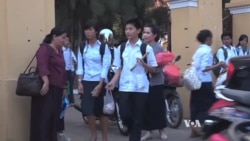Cambodia’s final exam results for 2014 were disastrous, with more than half of the 90,000 students failing. The reason? The authorities stamped out cheating - the first of a series of reforms designed to fix the impoverished country’s broken education sector.
The decision to stamp out cheating had a huge impact. Sixty percent of the class of 2014 failed their final year of school, despite getting a second chance to retake their tests in October.
The class of 2015 has taken note.
Final year student Rattana said his peers realize the “no cheating in exams” rule means they will need to apply themselves to pass and get into university.
“The new policy means we’re studying harder and not going out as much as we used to. It also means we won’t have to spend money during exams,” he said.
The new policy is courtesy of Education Minister Hang Chuon Naron, appointed a year ago after a decade as a deputy finance minister. Naron said reforming education is critical to Cambodia's development.
“So the most important factor is that there is a skills mismatch in Cambodia. And it becomes an obstacle to economic development, to growth, to attracting foreign direct investment. So we have investors coming in; they look for [a] skilled labor force - we don’t have enough. But at the supply side we have many graduates that cannot find jobs. And this is a problem that many countries are facing - the skills mismatch," said Naron.
The new policy aims for improved teacher training, better school governance, and promoting critical thinking and problem solving for Cambodia's 2.9 million school-age children.
Underpaid teachers will earn more and schools will get increased funding from an education budget that will rise sharply to $440 million.
Cambodia certainly has a long way to go: its ratio of 46 pupils per primary school teacher, for instance, is the worst in the world outside Africa.
The Asian Development Bank (ADB) is providing $90 million over five years to improve the quality of education and cut the dropout rate. The ADB's Sophea Mar applauds the government’s decision to boost education spending, but said that at 17 percent of expenditure, it’s still low.
“Budget allocation is important, but also expenditure is even more important. And this is a big challenge because you know the capacity at the school level, at the sub-national level, remains an issue. So reform is not just only taking place within the ministry. The reform has to start from the classroom, has to start from the lower level,” said Mar.
Ensuring these reforms succeed, he said, will need the backing not only of government, but of students, parents and the private sector.





